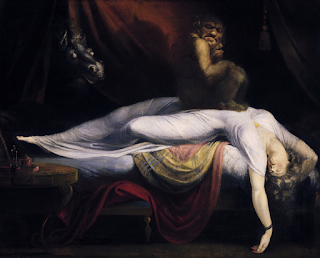 |
| John Henry Fuseli - The Nightmare (1781) |
Somebody you knew only vaguely in your small town drowned.
You had a cousin and when you were younger she smoked a cigarette and left a lipstick stain on it. Sometimes, even now, you remember being in a car with her.
A man condescends to you. You say nothing. A woman says something that wouldn't be snide, if it were someone else saying it. You say nothing. You never speak again, but not because of them. You simply have nothing that needs to be said.
The fun here is in summarizing a typical "Munrovian" (?) short story plot. Alice Munro's prose isn't particularly laconic, but it is economic.
It had been a couple of years. I was pleased to see her.
Her smile didn't reach her eyes.
"Ah, Persephone," she purred, as if I weren't there.
"My little shadow."
Something sank and shrank within me. If I found anything else to say, I don't remember it.
I met Alice Munro. She was the lady who, for one glorious Sunday School term, taught us Creative Writing. One week, as a writing prompt, she brought a print of that disturbing painting of a troll perched on a sleeping lady's belly.
I didn't know she was a writer, nor that she was famous. I just looked forward to Sunday School in a way I never had before or since.
Later, of course, I read several of her short stories and her novel Lives of Girls and Women, which isn't so much a novel as a collection of short stories about one awkward young girl growing up in a small Ontario town. Munro was a master of describing and distilling the acute embarrassment of adolescence, just as she was later to put a merciless finger on the disappointments of middle life and old age.
I don't know how autobiographical her stories are. I suspect Lives of Girls and Women probably is. They don't reflect my experience of life exactly - thank goodness - but they are uncomfortably familiar and certain images and phrases stab at me.
The latest prickle-fest I've been reading is The Love of a Good Woman, a short story collection published in 1998. It just showed up when I was spring-cleaning; I have no recollection of how it got into the house. The titular story and one called "Save the Reaper" are both creepy and border on being horror stories or thrillers - we're left hanging. The rest are pure Munro: very Canadian and melancholic. (Munro can be very funny; an early story, first published in 1961, called "A Ounce of Cure" is one of my favourites.) They are set in places I have been and peopled with characters I haven't met, but recognize. I reach the end of a story and am startled; each one reads like a novel.
I can't really say I like one over another; I rarely "like" a Munro tale, but they do resonate, rather painfully. Like that long-ago memory of the girl who thought of me - if she thought of me at all - as her shadow. As it happens, she was one of Alice Munro's daughters.






No comments:
Post a Comment